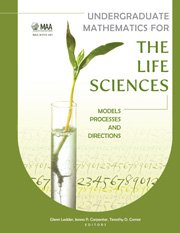Foreword: Looking Backward and Moving Forward in Undergraduate Life Science Quantitative Education
Summary
It is a pleasure to read the contributions in this book, particularly since the importance of mathematics in biology has only slowly been realized over the past several decades by the biological research and education community. When I organized a Quantitative Sciences Curriculum for the Life Sciences Students workshop in 1992 for leading practitioners of mathematical biology, there were few mathematics courses designed specifically for life science students and many bench biologists were unconvinced of a need for quantitative education. Although I did not know it at the time, several of the issues addressed in the 1992 and later workshops I organized had been the subject of the Cullowhee Conference on Training in Biomathematics held in 1961 at Western Carolina University in Cullowhee, North Carolina, and attended by many leading mathematical biologists. Issues addressed at the Cullowhee Conference still reverberate today, including: “To what extent should mathematical courses given to biologists be different from those given to mathematicians?” (H.D. Landahl) and “Traditional biology courses lay far too much emphasis on the direct acquisition of information. Insufficient attention is given to the interpretation of facts or to the drawing of conclusions from observation and experience.” (J. G. Skellam).
So have we learned anything in the fifty years since the Cullowhee Conference? This volume is a testament to a resounding YES! Many model programs have been developed, curricular material has been assembled, biologists are more attuned to the utility of quantitative approaches, and education research provides guidance on what works – learning not training, research participation not canned labs, active learning and peer collaboration not listening to lectures. We have moved beyond anecdotes to the science of science education.
- Type
- Chapter
- Information
- Undergraduate Mathematics for the Life SciencesModels, Processes, and Directions, pp. vii - viiiPublisher: Mathematical Association of AmericaPrint publication year: 2013



